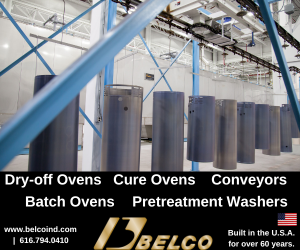Electrocoat As a Primer
Question: Since electrocoat is used so extensively as a primer in the auto industry, how can it be used as a primer in other industries?
Question:
Since electrocoat is used so extensively as a primer in the auto industry, how can it be used as a primer in other industries? Does it improve the performance of powder coating when used as a primer? M.M.
Answer:
While the development of electrocoat as an automotive primer has progressed, all of the advantages provided to the auto industry can be used in many other industries. The current cathodic epoxy automotive primers (as well as several previous generations) provide excellent corrosion protection as stand-alone coatings and provide corrosion enhancement as a primer.
Almost all automotive electrocoats are applied over zinc phosphate pretreatment with chromic acid seals to maximize corrosion protection. The electrocoat material provides such good corrosion protection that it can also be used in place of high-performance pretreatment. Minimum pretreatment, all the way down to single stage neutral cleaner/coaters, two- or three-stage power washers or wand-wash pretreatment are acceptable for electrocoat (with some reduction in corrosion protection). As long as parts are clean (blasting or pickling are also acceptable), they will coat. The epoxy resin system provides the corrosion protection. The newer electrocoats are also capable of dry film thickness (DFT) of 2 mils or greater compared to the original automotive electrocoats, which were 0.8 mil or less. Also, remember that the transfer efficiency of electrocoat is 95% or more.
When I was involved in electrocoating as a custom coater, we regularly competed with zinc plating on a cost-per-part basis as long as the parts were rack (not barrel) plated. Corrosion protection was also comparable, based on salt spray. We also had several cases where customers were able to fabricate parts from CRS versus zinc-coated steel. This also provided them with the secondary benefit of not having to deal with the problems of welding the zinc-coated substrate.
Electrocoat is an excellent primer for powder as well as liquid topcoats. The only warning that I would make, based on experience, is to check intercoat adhesion and physical tests such as impact and conical mandrel. The epoxy electrocoats are quite hard (4H-5H pencil hardness) and some topcoats have trouble “getting hold” of the electrocoat. One possible solution, if this is a problem, is to under-cure (dehydrate only) the electrocoat as long as the cure temperature of the topcoat is sufficient to finish curing the electrocoat. All but the low-cure powders should provide an adequate final cure for both coatings.
Another use of electrocoat as a primer that we promoted as a custom coater was to only topcoat the exposed portion of the product. Parts such as agricultural tractor grille screens were electrocoated first and powder coated back-to-back with a polyester powder to provide the UV protection desired. The back-to-back powder coating meant getting two parts for the price of one as far as line density and powder use was concerned. The electrocoat provided 100% uniform coverage of all the perforated holes and the powder provided the UV protection with little plugging of some very small holes. Electrocoat also provides penetration into “nooks and crannies” that are hard to reach with powder or liquid. Again, as a primer, the electrocoat provides the corrosion protection with the topcoat providing color only. The only limitations in this area of using electrocoat is the problem of air pockets or “puddles” with the electrocoat process requiring immersion of the parts.
Related Content
Enhanced Functionality, Commercial Viability
Nano-particle additives modify coating performance to protect sensitive electronic devices.
Read MoreFinishing High Reliability, Function Critical Parts
From safety critical automotive and aerospace components to lifesaving medical micro-components and implantable devices, Indiana-based Electro-Spec finishes applications that require zero failure rates.
Read MoreTin and Tin Zinc Overview and Growth
Brett Larick of Columbia Chemical discusses the increasing demand for conductive finishes driven by the increasing electrification of vehicles.
Read MoreA Remarkable Rolls
Alex Innes, head of coachbuild design, Rolls-Royce Motor Cars, describes the specially commissioned La Rose Noire Droptail as “glamour distilled.” The finishes, outside and in, contribute largely to that charm.
Read MoreRead Next
Episode 45: An Interview with Chandler Mancuso, MacDermid Envio Solutions
Chandler Mancuso, technical director with MacDermid Envio discusses updating your wastewater treatment system and implementing materials recycling solutions to increase efficiencies, control costs and reduce environmental impact.
Read MoreA ‘Clean’ Agenda Offers Unique Presentations in Chicago
The 2024 Parts Cleaning Conference, co-located with the International Manufacturing Technology Show, includes presentations by several speakers who are new to the conference and topics that have not been covered in past editions of this event.
Read MoreDelivering Increased Benefits to Greenhouse Films
Baystar's Borstar technology is helping customers deliver better, more reliable production methods to greenhouse agriculture.
Read More








.jpg;maxWidth=300;quality=90)
















